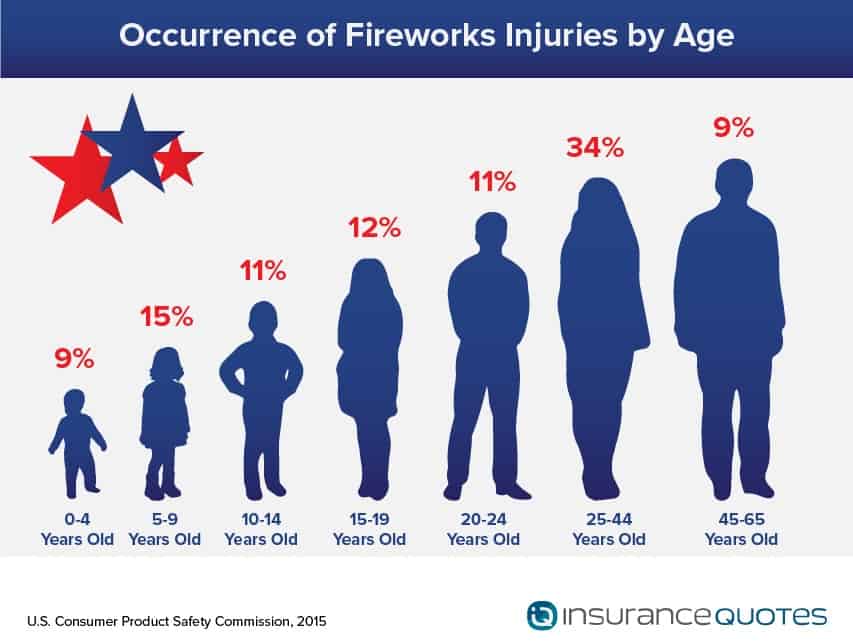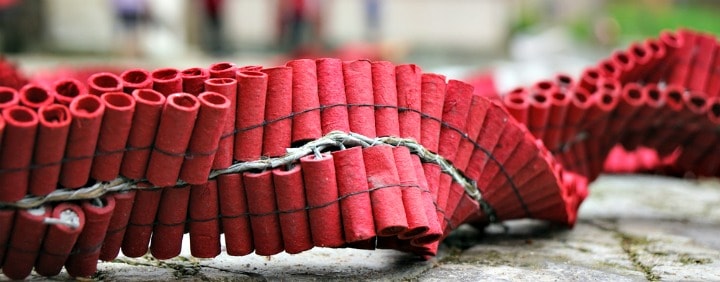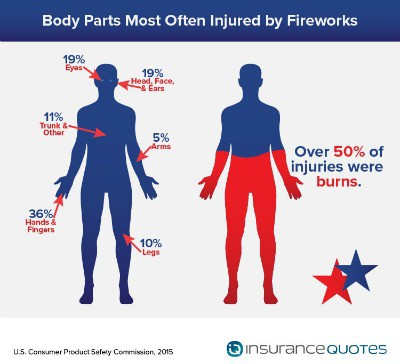Are Legal Fireworks Safe? Improper Use Leads to Thousands of Injuries Each Year
When it comes to fireworks and Fourth of July celebrations it seems all states are not created equally. What you and your family can enjoy in a Texas backyard is probably illegal in an empty New Jersey field. This makes legally purchasing and setting off fireworks a tricky path to navigate.
Three states leave fireworks strictly to the pros. Delaware, Massachusetts and New Jersey all have laws banning consumer fireworks. Four others — Illinois, Iowa, Ohio and Vermont — only allow certain types of sparklers and limited novelty items.
Does that make folks in the Midwest and Northeast less patriotic? Doubtful. It seems safety concerns have been the motivating factor for lawmakers regarding consumer fireworks regulations with a handful of states taking legislative action.
Recent data suggests these states could be onto something.

The U.S. Consumer Protections Safety Commission reports that 2015 saw more deaths and injuries from fireworks than in the previous 15 years. Nearly 12,000 people were taken to hospitals that year with fireworks-related injuries and 11 people died from fireworks mishaps. The numbers were only slightly better in 2016 with four deaths and 11,000 people treated at hospitals.
Commission Chairman Elliot F. Kaye blames some of this spike on lax government legislation.
RELATED: Do You Need Swimming Pool Insurance?
“With more states relaxing their laws and allowing more types of fireworks to be purchased and used by consumers, we need to do more to prevent kids and adults from being rushed to the hospital,” Kaye says.
Different fireworks mean different safety risks
With the vast majority of the nation living in the 43 states and the District of Columbia where many consumer fireworks are legal, experts suggest purchasers arm themselves with safety information well before heading to the local fireworks stand.
The National Safety Council stresses that consumers need to know the hazards of some of the most popular types of fireworks on the market:
Sparklers
Kids of all ages seem to enjoy holding sparklers during Fourth of July celebrations. But the items are more dangerous than you may think. Parents probably don’t realize that these seemingly harmless sticks burn at about 2,000 degrees — hot enough to melt some metals.
Sparklers can quickly ignite clothing, and many children have received severe burns from dropping sparklers on their legs and feet.
Bottle rockets
These small rockets are attached to a stick, lit by a fuse and typically fired from some type of bottle. Teens have been known to have bottle rocket wars, firing them at one another and causing injuries to the head, torso and face.
Doctors at Vanderbilt University Medical Center have experienced so many eye injuries as a result of bottle rocket accidents that they conducted a study to better educate the public on fireworks safety.
“The majority of the children (in the study) ended up with reduced vision, and probably half of those were deemed legally blind,” said Dr. Franco Recchia, associate professor of ophthalmology and visual sciences at Vanderbilt.

Firecrackers
Firecrackers are designed to explode on the ground, but careless users sometimes don’t budget enough time after lighting them. A firecracker going off in your hand can cause serious injury, including the loss of a finger. One firecracker can be dangerous enough, but many are often linked together by a long fuse and explode in a series. It can make for a dramatic sight, but bundled fireworks also up the chances for injury.
Smoke bombs
Smoke bombs may seem harmless because they don’t explode, they just emit smoke. Some are best if used during the day because it’s difficult to see smoke at night. Generally, two types of smoke bombs can be purchased at your local fireworks stand: color smoke balls or cylindrical smoke grenades. Smoke balls come in a variety of colors and may, on the surface, pose little danger.
However, always check the types of chemicals used to create the smoke. Also, be sure not to use these in large crowds because they can cause panic and confusion that could lead to injury.
Roman candles
Roman candles eject multiple exploding shells from a tube the user holds by hand. Sound dangerous? It can be. The hands are the most common part of the body injured by fireworks. There have been numerous reports of children losing fingers, severe burns and other injuries, which are sometimes caused when the device gets jammed or user carelessness.
Safety tips for consumer fireworks
 And there’s also injury to property to consider.
And there’s also injury to property to consider.
If you set your home on fire with fireworks that are legal in your state, your home insurance or your renter’s insurance should provide coverage. But what if you indulge in fireworks that are prohibited in your state? Your insurance policy might not provide any coverage at all.
The best move is to call your insurance provider before you schedule a backyard fireworks display to determine if your policy will cover the damage that these fireworks might cause.
It’s important, though, for homeowners to check their state’s regulations. Louisiana, for instance, forbids residents from shooting off cherry bombs, roman candles that emit more than 10 balls of flame and firecrackers larger than one-and-a-half inches in length.
In Colorado, residents are only allowed to shoot off specific fireworks including ground spinners, cone fountains and glow worms.
So, if you are going to partake in fireworks, know what you’re buying and follow these rules.
The CPSC recommend that you follow these safety tips:
- Never allow young children to handle fireworks
- Older children should use them only under close adult supervision
- Anyone using fireworks or standing nearby should wear protective eyewear
- Never light them indoors
- Only use them away from people, houses and flammable material
- Only light one device at a time and maintain a safe distance after lighting
- Never ignite devices in a container
- Do not try to re-light or handle malfunctioning fireworks
- Soak unused fireworks in water for a few hours before discarding
- Keep a bucket of water nearby to fully extinguish fireworks that don’t go off or in case of fire